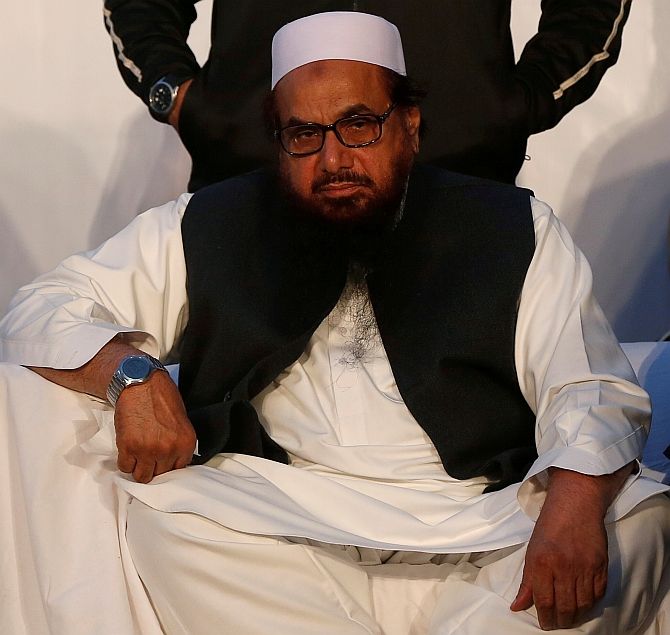India's most wanted terrorist, Hafiz Mohammad Saeed warns Prime Minister Narendra Modi, says the latter is seriously mistaken if he thinks he would get respite in Kashmir after his arrest.

Jamaat-ud-Dawah chief Hafiz Saeed's detention may help ease India-Pakistan tension, media reports in Islamabad said on Tuesday even as supporters of the Mumbai attack mastermind launched protests across major cities against the government's decision which they say was taken under pressure from the US and India.
This even as a defiant Saeed claimed that his detention would give a "fresh impetus" to the Kashmiris' "struggle against India".
Saeed, who was allowed to hold a press conference before he left for his home along with dozens of his supporters amid high police security, said, "My detention order has come from Washington and not Islamabad."
"If someone thinks that placing me under house arrest will help check freedom movement in Kashmir he is living in a fool's paradise. My arrest will give a fresh impetus to the Kashmiris' struggle against India," he said.
68-year-old Saeed further said if Indian Prime Minister Narendra Modi thinks that he would get respite in Kashmir after his arrest he is seriously mistaken.
"We have declared 2017 a year of solidarity for Kashmiris," he said, adding that all programmes planned for February 5 will be held across Pakistan and PoK.
He vowed to challenge his house arrest in the Lahore High Court.

According to the Punjab Home Department notification, "Both JuD and FIF are engaged in certain activities which could be prejudicial to peace and security and in violation of Pakistan's obligations to the United Nations Security Council Resolution. And accordingly both organisations have been placed in the Second Schedule of Anti-Terrorism Act 1997."
Similarly, it said JuD chief Saeed is engaged in certain activities which could be prejudicial to peace and security.
"He is placed in the Fourth Schedule of Anti-Terrorism Act 1997 and put under detention for a period 90 days," it said.
"The government has detained Saeed and four other JuD and Falaha-i-Insanyat (FIF) leaders for 90 days with effect from January 30 but this detention may further be extended on completion of this period if required," an Interior Ministry official said.
The government may take some further steps against the JuD and its sister organisations in coming days, the official said, adding that the names of several activists of JuD and FIF, a charity run by Saeed, have been placed on Exit Control List to stop them from leaving the country.
As he was placed under house arrest, his supporters launched protests in cities like Islamabad, Lahore and Karachi.
"The detention of Hafiz Saeed could help ease tensions between nuclear-armed foes Pakistan and India, although New Delhi has not yet responded," Express Tribune commented.
It said that the 2008 Mumbai attack brought Pakistan and India to the brink of war after 10 gunmen killed 166 people in a rampage that included attacks on two luxury hotels, a Jewish center and a train station.
Saeed has denied any role in the attack and has distanced himself from LeT, while leading his charity JuD.

Supporters accused Nawaz Sharif government of succumbing to the wishes of the US, which has offered a $10 million reward for information leading to Saeed's arrest.
"This government has buckled under the pressure," JuD spokesperson Nadeem Awan said who also accused India of pressurising the government.
Another spokesperson, Farooq Azam, announced protests in Karachi by "different religious and Kashmiri leaders".
The paper said a senior Pakistani defence ministry official said Islamabad had not been contacted by the new US administration of Donald Trump but had been feeling US pressure on the issue.
"Trump is taking hard decisions against Muslim countries, there is open talk of actions against Pakistan also. So yes, this was a consideration," said the official.
Other government officials have said recently that a broader diplomatic campaign -- pushed by India -- to isolate Pakistan has taken a toll, even involving pressure from longtime ally China.
Four days back, Punjab's Ministry of Interior had included names of Saeed and four others -- Abdullah Ubaid, Zafar Iqbal, Abdur Rehman Abid and Qazi Kashif Niaz -- in the Watch List as per UNSC 1267 Sanctions and ordered their preventive detention.
Ubaid, Iqbal, Abid and Niaz were also also taken into preventive custody, Pakistani media reported.
Punjab government's action comes amidst pressure on Pakistan from the Trump administration that it must take action against JuD and Saeed to avoid sanctions.
JuD is the front for the banned Lashkar-e-Tayiba terror outfit which is responsible for numerous terror attacks in India, including the Mumbai terror strike of November 26,2008, which was masterminded by Saeed.
JuD has already been declared as a foreign terrorist organisation by the United States in June 2014. Earlier too Saeed was put under house arrest after the Mumbai attack, but was released about six months later in June 2009 after a court order.










 © 2025
© 2025